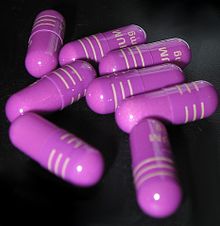 Another study finding that diet (what one eats) can work just as well as medications for a health condition - this time for one form of acid reflux disease. The researchers found that a Mediterranean style diet worked just as well as, and actually worked better, than medications for laryngopharyngeal reflux (LPR). They think these beneficial results will also work for gastroesophageal reflux disease (GERD). The plant-based Mediterranean diet (lots of fruits, vegetables, legumes, whole grains, seeds, nuts, olive oil, more fish and less meat) in the study has lots of other health benefits, while common medications (proton pump inhibitors - PPI) for reflux have many side effects, including very serious ones with prolonged use (stroke, heart attack, dementia, kidney damage).
Another study finding that diet (what one eats) can work just as well as medications for a health condition - this time for one form of acid reflux disease. The researchers found that a Mediterranean style diet worked just as well as, and actually worked better, than medications for laryngopharyngeal reflux (LPR). They think these beneficial results will also work for gastroesophageal reflux disease (GERD). The plant-based Mediterranean diet (lots of fruits, vegetables, legumes, whole grains, seeds, nuts, olive oil, more fish and less meat) in the study has lots of other health benefits, while common medications (proton pump inhibitors - PPI) for reflux have many side effects, including very serious ones with prolonged use (stroke, heart attack, dementia, kidney damage).
It must be noted that the Mediterranean style diet group was also told to drink alkaline water, and both groups were told to follow "standard reflux precautions" (no coffee, tea, chocolate, soda, greasy, fried, fatty and spicy foods, and alcohol). However, the researchers point out that " prior studies have demonstrated little clinical change in reflux incidence with these lifestyle approaches" - meaning both groups in this study were told to follow standard reflux precautions, even though prior studies showed there was no benefit in doing so. (So why did they have the people follow them?)
Many studies have found numerous health benefits from a Mediterranean style diet, but it is unclear whether alkaline water has any health benefits, and the only study the researchers mention about alkaline water and GERD was done in laboratory tests (on cells), rather than in humans - so we really don't know (need studies!). Perhaps only a Mediterranean style diet is sufficient to treat acid reflux disease? Bottom line: dietary changes work best, benefits occur quickly (within a few weeks), and have many health benefits - therefore try them first in treating reflux symptoms. From Medical Xpress:
Mediterranean-style diet may eliminate need for reflux medications
A plant-based, Mediterranean-style diet has been shown to provide the same medical benefits for treating laryngopharyngeal reflux as popular reflux medications. .... When compared to patients who took the traditional reflux medication, proton pump inhibitors (PPI), those patients who consumed a 90-95% whole food, plant-based, Mediterranean-style diet paired with alkaline water had the same if not better reduction in reflux symptoms. 62.6 percent of patients treated with a plant-based diet and alkaline water saw a six point reduction in their Reflux Symptom Index (RSI - a measurement for the severity of reflux symptoms), compared to 54.1 percent reduction in patients taking PPI's.
Though this research only focused on those with laryngopharyngeal reflux, this same diet regimen has implications to help patients with gastro-esophageal acid reflux (also known as GERD). Lead author of the study, Craig H. Zalvan, MD, FACS, chief of Otolaryngology and medical director of The Institute for Voice and Swallowing Disorders at Northwell Health's Phelps Hospital and researcher at the Feinstein Institute, said he was formerly one of the largest prescribers of PPI's in the region. Feeling that there had to be a better approach to treating reflux conditions like laryngopharyngeal reflux, he started to research alternatives. "Although effective in some patients, I felt medication couldn't be the only method to treat reflux and recent studies reporting increased rates of stroke and heart attack, dementia and kidney damage from prolonged PPI use made me more certain," said Dr. Zalvan.
The diet suggested by Dr. Zalvan consists of mostly fruits, vegetables, grains and nuts with near complete cessation of dairy and meats including beef, chicken, fish, eggs and pork. This is in addition to standard reflux diet precautions like avoiding coffee, tea, chocolate, soda, greasy and fried food, spicy foods, fatty foods and alcohol. Along with relieving reflux symptoms, Dr. Zalvan noted that many of his patients who were treated with a plant-based diet also experienced some weight loss and a reduction of symptoms and medication use from other medical conditions like high blood pressure and high cholesterol. Dr. Zalvan said that a plant-based diet approach with alkaline water and standard reflux precautions should either be attempted prior to the use of medication or with the short-term use of medication for more severe needs. [Original study.]

 Uh oh - once again a drug taken for a common problem (heartburn) is linked to an unexpected negative health effect (higher risk of strokes). Millions of Americans take proton pump inhibitors (PPIs) to treat acid reflux and heartburn. They are among the most prescribed drugs in the United States, are frequently taken for long periods of time, and are available over the counter. But according to preliminary research presented at a 2016 American Heart Association conference, these medications may also increase the risk of ischemic stroke. Ischemic strokes, which are the most common type of stroke, occur when a blood clot cuts off blood flow to the brain.
Uh oh - once again a drug taken for a common problem (heartburn) is linked to an unexpected negative health effect (higher risk of strokes). Millions of Americans take proton pump inhibitors (PPIs) to treat acid reflux and heartburn. They are among the most prescribed drugs in the United States, are frequently taken for long periods of time, and are available over the counter. But according to preliminary research presented at a 2016 American Heart Association conference, these medications may also increase the risk of ischemic stroke. Ischemic strokes, which are the most common type of stroke, occur when a blood clot cuts off blood flow to the brain.